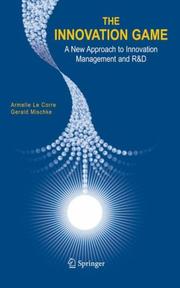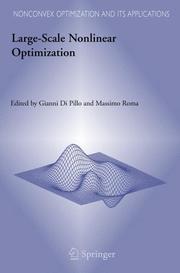| Listing 1 - 10 of 177 | << page >> |
Sort by
|
Book
ISBN: 0128131357 0128131349 9780128131350 9780128131343 Year: 2018 Publisher: London, United Kingdom : Academic Press, an imprint of Elsevier,
Abstract | Keywords | Export | Availability | Bookmark
 Loading...
Loading...Choose an application
- Reference Manager
- EndNote
- RefWorks (Direct export to RefWorks)
Keys to Running Successful Research Projects: All the Things They Never Teach You provides a step-by-step guide for the management of a successful research project or program. Through the use of illustrative case studies, the book covers all aspects of management that should be included during researcher training, helping researchers overcome the many challenges they face in their day-to-day management of people, time and resources. Links throughout provide more detailed information from gold standard sources on every topic. It is a must-have reference for postdocs, research managers and administrators in colleges, universities, hospitals and research institutes. In addition, it is an ideal resource for those working in grant and contract funding groups in the life sciences and medical fields.
Research --- Management. --- Research management
Book
ISBN: 9780511802508 9780521513616 9780521735063 9780511769931 0511769938 9780511763786 0511763786 9780511848025 0511848021 9780511766183 0511766181 0511802501 9780511768255 0511768257 0521735068 0521513618 661265340X 9786612653407 110720609X 1282653407 0511769091 0511766866 0511765479 Year: 2009 Publisher: Cambridge ; New York : Cambridge University Press,
Abstract | Keywords | Export | Availability | Bookmark
 Loading...
Loading...Choose an application
- Reference Manager
- EndNote
- RefWorks (Direct export to RefWorks)
"Scientific research requires both innovation and attention to detail, clever breakthroughs and routine procedures. This indispensable guide gives students and researchers across all scientific disciplines practical advice on how to succeed. All types of scientific careers are discussed, from those in industry and academia to consulting, with emphasis on how scientists spend their time and the skills that are needed to be productive. Strategic thinking, creativity and problem-solving, the central keys to success in research, are all explored. The reader is shown how to enhance the creative process in science, how one goes about making discoveries, putting together the solution to a complex problem and then testing the solution obtained. The social dimension of science is also discussed from the development and execution of a scientific research program to publishing papers, as well as issues of ethics and science policy." --NHBS Environment Bookstore.
Science --- Research --- Research management --- Science as a profession --- Scientists --- Vocational guidance. --- Management. --- Vocational guidance
Book
ISBN: 0128016817 0128013966 9780128016817 9780128013960 Year: 2015 Publisher: Amsterdam, [Netherlands] : Academic Press,
Abstract | Keywords | Export | Availability | Bookmark
 Loading...
Loading...Choose an application
- Reference Manager
- EndNote
- RefWorks (Direct export to RefWorks)
Global Mobility of Research Scientists: The Economics of Who Goes Where and Why brings together information on how the localization and mobility of academic researchers contributes to the production of knowledge. The text answers several questions, including ""what characterizes nationally and internationally mobile researchers?"" and ""what are the individual and social implications of increased mobility of research scientists?"" Eight independent, but coordinated chapters address these and other questions, drawing on a set of newly developed databases covering 30 countries, including t
Research -- Economic aspects. --- Research -- Management. --- Research -- Social aspects. --- Scientists -- Social aspects. --- Scientists. --- Sciences - General --- Physical Sciences & Mathematics --- Research --- Scientists --- Social aspects. --- Economic aspects. --- Professional employees --- Science --- Science research --- Scientific research --- Information services --- Learning and scholarship --- Methodology --- Research teams
Book
ISBN: 0128052082 0128050594 9780128050590 9780128052082 Year: 2018 Publisher: London, England : Academic Press,
Abstract | Keywords | Export | Availability | Bookmark
 Loading...
Loading...Choose an application
- Reference Manager
- EndNote
- RefWorks (Direct export to RefWorks)
Research --- Management. --- Research management --- 098 Bedrijfskunde --- 790 Wetenschapsbeleid --- Management --- Science --- Science research --- Scientific research --- Information services --- Learning and scholarship --- Methodology --- Research teams --- Europe. --- Council of Europe countries --- Eastern Hemisphere --- Eurasia
Book
ISBN: 1787692035 1787692051 1787692043 178769206X 9781787692039 9781787692053 9781787692046 Year: 2019 Publisher: Bingley, England : Emerald Publishing,
Abstract | Keywords | Export | Availability | Bookmark
 Loading...
Loading...Choose an application
- Reference Manager
- EndNote
- RefWorks (Direct export to RefWorks)
Scientific progress - from creating better medicines to building better bridges or designing improved technology networks - can lead to intriguing business opportunities, but business expertise is not always a natural companion to scientific excellence. Scientists require a nuanced understanding of the modern business environment to successfully navigate the commercial world and maximise the economic potential of their ideas. Management for Scientists explores the core theories and practices in management studies today in a context applicable to those working in the scientific industries. Essential business concepts covered include corporate strategy and business planning, organisation structure, management and operations, and labour and human resources, and these are all viewed through the prism of building, maintaining and developing a scientific business in the pharmaceutical, biotechnology, engineering, maths, and computing sectors. Chapters feature a range of real-world examples from modern science-driven businesses, presented by experienced scientists with demonstrated strategic and economic business expertise.
Research --- Research management --- Management. --- Management --- E-books --- Science --- Business planning. --- Business & Economics --- Management & management techniques. --- Vocational guidance. --- Business enterprises --- Business plans --- Corporate planning --- Corporate strategy --- Corporations --- Strategy, Corporate --- Planning --- Strategic planning --- Science as a profession --- Scientists --- Vocational guidance
Book
ISBN: 0081002378 0081001959 9780081002377 9780081001950 Year: 2015 Publisher: Waltham, MA : Chandos Publishing,
Abstract | Keywords | Export | Availability | Bookmark
 Loading...
Loading...Choose an application
- Reference Manager
- EndNote
- RefWorks (Direct export to RefWorks)
Innovative technologies are changing the way research is performed, preserved, and communicated. Managing Scientific Information and Research Data explores how these technologies are used and provides detailed analysis of the approaches and tools developed to manage scientific information and data. Following an introduction, the book is then divided into 15 chapters discussing the changes in scientific communication; new models of publishing and peer review; ethics in scientific communication; preservation of data; discovery tools; discipline-specific practices of researchers for gathering an
Database management. --- Information storage and retrieval systems. --- Research -- Data processing -- Management. --- Research -- Methodology. --- Sciences - General --- Physical Sciences & Mathematics --- Science --- Knowledge management --- Management. --- Science. --- Natural science --- Natural sciences --- Science of science --- Sciences --- Management of knowledge assets --- Management --- Information technology --- Intellectual capital --- Organizational learning --- Research - Management --- Information technology - Management --- Science - Management --- Science - Information technology --- 001.891 --- Research --- Research management --- 001.891 Wetenschappelijk onderzoek. Research. Onderzoekmethoden --- Wetenschappelijk onderzoek. Research. Onderzoekmethoden --- Technological innovations. --- Data processing. --- Information technology. --- Scientific applications.
Book
ISBN: 1282361694 9786612361692 144190817X Year: 2009 Publisher: New York : Springer Science,
Abstract | Keywords | Export | Availability | Bookmark
 Loading...
Loading...Choose an application
- Reference Manager
- EndNote
- RefWorks (Direct export to RefWorks)
This Festschrift honors George Samuel Fishman, one of the founders of the field of computer simulation and a leader in the disciplines of operations research and management science for the past five decades. The papers in this volume span the theory, methodology, and application of computer simulation. Renowned researcher, teacher, mentor, and author, Fishman has made fundamental contributions to both the theory and practice of simulation, the dissemination of knowledge, service to the profession, and the advancement of the status of the field. Among his many honors and awards are the Distinguished Service Award from TIMS/College on Simulation; the Frederick W. Lanchester Prize from INFORMS; and the INFORMS Simulation Society’s Lifetime Professional Achievement Award. Individual papers in this volume include a biography and then an interview with Fishman; Computer Intensive Statistical Model Building; Patchwork Distributions; Asymptotic Validity of Batch Means Steady-State Confidence Intervals; Efficient Modeling of Delays in Discrete-Event Simulation; Sampling from Linear Multivariate Densities; Factor Screening in Simulation Experiments; and many others that all honor the achievements, influence, and friendship of George Samuel Fishman. .
Operations research --- Computer programs. --- Data processing. --- Operational analysis --- Operational research --- Industrial engineering --- Management science --- Research --- System theory --- Operations research. --- Computer science --- Mathematical optimization. --- Operations Research/Decision Theory. --- Computational Mathematics and Numerical Analysis. --- Operations Research, Management Science. --- Optimization. --- Mathematics. --- Optimization (Mathematics) --- Optimization techniques --- Optimization theory --- Systems optimization --- Mathematical analysis --- Maxima and minima --- Simulation methods --- System analysis --- Computer mathematics --- Discrete mathematics --- Electronic data processing --- Mathematics --- Decision making. --- Computer mathematics. --- Management science. --- Quantitative business analysis --- Management --- Problem solving --- Statistical decision --- Deciding --- Decision (Psychology) --- Decision analysis --- Decision processes --- Making decisions --- Management decisions --- Choice (Psychology) --- Decision making --- Fishman, George S. --- Mathematics—Data processing. --- Operations Research and Decision Theory. --- Operations Research, Management Science .

ISBN: 1280462248 9786610462247 0387233946 0387233784 1461498457 Year: 2005 Publisher: New York : Springer,
Abstract | Keywords | Export | Availability | Bookmark
 Loading...
Loading...Choose an application
- Reference Manager
- EndNote
- RefWorks (Direct export to RefWorks)
Applied probability is a broad research area that is of interest to scientists in diverse disciplines in science and technology, including: anthropology, biology, communication theory, economics, epidemiology, finance, geography, linguistics, medicine, meteorology, operations research, psychology, quality control, sociology, and statistics. Recent Advances in Applied Probability is a collection of survey articles that bring together the work of leading researchers in applied probability to present current research advances in this important area. This volume will be of interest to graduate students and researchers whose research is closely connected to probability modelling and their applications. It is suitable for one semester graduate level research seminar in applied probability.
Probabilities. --- Probability --- Statistical inference --- Combinations --- Mathematics --- Chance --- Least squares --- Mathematical statistics --- Risk --- Distribution (Probability theory. --- Mathematics. --- Probability Theory and Stochastic Processes. --- Operations Research, Management Science. --- Mathematics, general. --- Math --- Science --- Distribution functions --- Frequency distribution --- Characteristic functions --- Probabilities --- Operations research. --- Management science. --- Quantitative business analysis --- Management --- Problem solving --- Operations research --- Statistical decision --- Operational analysis --- Operational research --- Industrial engineering --- Management science --- Research --- System theory

ISBN: 1280190361 9786610190362 0387238433 0387237941 1441936610 Year: 2005 Publisher: New York, N.Y. : Springer,
Abstract | Keywords | Export | Availability | Bookmark
 Loading...
Loading...Choose an application
- Reference Manager
- EndNote
- RefWorks (Direct export to RefWorks)
RandD is the single most important investment for any company or any society. Its ultimate product is an innovation. Innovations are on the other side the major propeller for the respective (socio-) economic development of the very company or society. Management and management science mainly treat RandD and innovations as costs or budgets to be managed, an approach that is in stark contrast to their overwhelming importance. This and the very fact that RandD and innovation success is a by necessity a-priori unknown and thus uncertain ex-post definition is not at all being respected properly up to now. In The Innovation Game La Corre and Mishchke consider RandD and innovation as an inherently risky investment which should be profitable, at least on average. Applying a statistical filter model, the authors are able to describe the RandD- and the innovation-process in great detail, almost like a production process. As a metaphor, the book tries to describe it like the control laws of the "distillery for inno-success knowledge". The corresponding control model and the derived inno-management rules do allow the authors to compute and optimize the respective success-chances, the appropriate processes and the suited organizational structures of a targeted "inno-success distillery", the innovation-/RandD-pipeline, in an unprecedented way.
Technological innovations --- Research --- Research, Industrial --- Management. --- Economic aspects. --- Research management --- Economic policy. --- R & D/Technology Policy. --- Innovation/Technology Management. --- Administration --- Industrial relations --- Organization --- Economic nationalism --- Economic planning --- National planning --- State planning --- Economics --- Planning --- National security --- Social policy --- Industrial management. --- Business administration --- Business enterprises --- Business management --- Corporate management --- Corporations --- Industrial administration --- Management, Industrial --- Rationalization of industry --- Scientific management --- Management --- Business --- Industrial organization

ISBN: 1280609435 9786610609437 0387300651 0387300635 1441940146 Year: 2006 Publisher: New York, N.Y. : Springer,
Abstract | Keywords | Export | Availability | Bookmark
 Loading...
Loading...Choose an application
- Reference Manager
- EndNote
- RefWorks (Direct export to RefWorks)
Large-Scale Nonlinear Optimization reviews and discusses recent advances in the development of methods and algorithms for nonlinear optimization and its applications, focusing on the large-dimensional case, the current forefront of much research. The chapters of the book, authored by some of the most active and well-known researchers in nonlinear optimization, give an updated overview of the field from different and complementary standpoints, including theoretical analysis, algorithmic development, implementation issues and applications. Audience This book is intended for researchers in applied mathematics, advanced engineering, and computer science; it is also recommended for further reading within graduate studies, postgraduate and doctoral programs.
Nonlinear theories --- Mathematical optimization --- Mathematical optimization. --- Optimization. --- Science, Humanities and Social Sciences, multidisciplinary. --- Operations Research, Management Science. --- Optimization (Mathematics) --- Optimization techniques --- Optimization theory --- Systems optimization --- Mathematical analysis --- Maxima and minima --- Operations research --- Simulation methods --- System analysis --- Operations research. --- Management science. --- Quantitative business analysis --- Management --- Problem solving --- Statistical decision --- Operational analysis --- Operational research --- Industrial engineering --- Management science --- Research --- System theory
| Listing 1 - 10 of 177 | << page >> |
Sort by
|

 Search
Search Feedback
Feedback About UniCat
About UniCat  Help
Help News
News